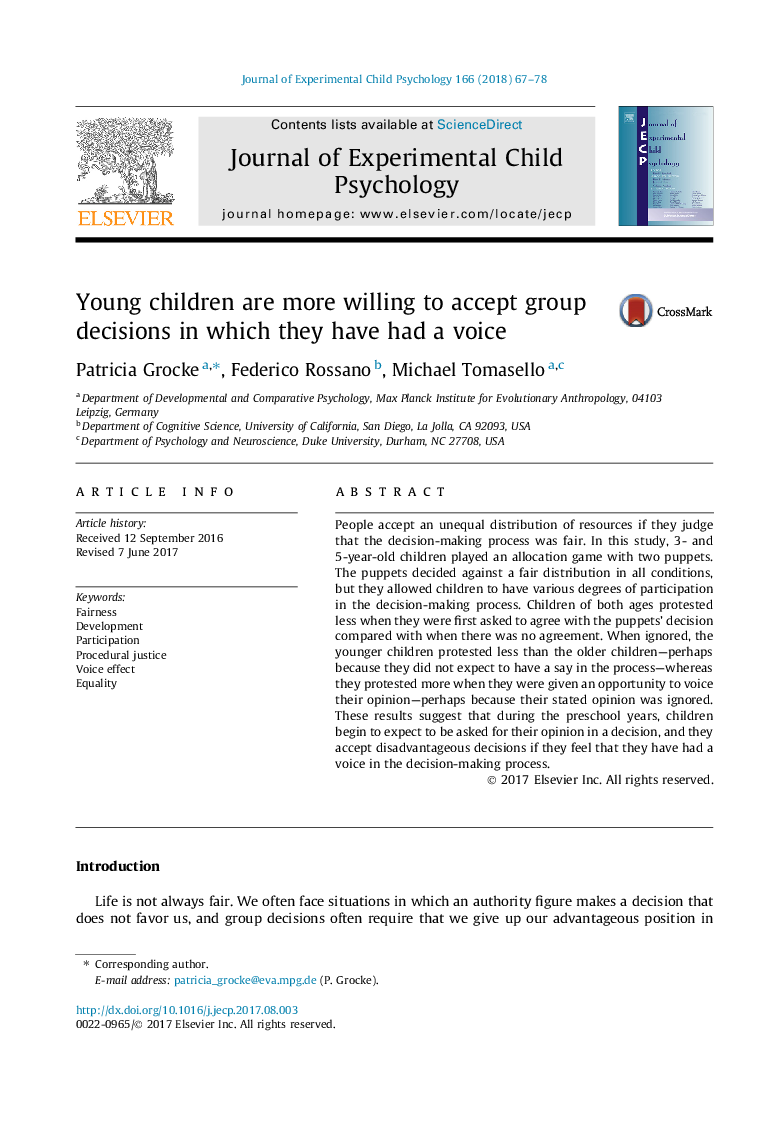| کد مقاله | کد نشریه | سال انتشار | مقاله انگلیسی | نسخه تمام متن |
|---|---|---|---|---|
| 7274194 | 1473446 | 2018 | 12 صفحه PDF | دانلود رایگان |
عنوان انگلیسی مقاله ISI
Young children are more willing to accept group decisions in which they have had a voice
ترجمه فارسی عنوان
کودکان کوچک تر تمایل دارند تصمیمات گروهی بگیرند که در آن صدای آنها را داشته باشد
دانلود مقاله + سفارش ترجمه
دانلود مقاله ISI انگلیسی
رایگان برای ایرانیان
کلمات کلیدی
عادلانه، توسعه، مشارکت، عدالت رویه ای، اثر صوتی، برابری،
ترجمه چکیده
اگر مردم قضاوت کنند که روند تصمیم گیری منصفانه است، مردم توزیع نابرابر منابع را قبول می کنند. در این مطالعه، کودکان 3 تا 5 ساله یک بازی تخصیصی با دو عروسک بازی کردند. عروسک ها در برابر همه ی شرایط توزیع منصفانه تصمیم گرفتند، اما آنها اجازه دادند که کودکان در مرحله ی تصمیم گیری در سطوح مختلف شرکت کنند. کودکان در هر دو سنی کمترین اعتراض را نسبت به زمانی که توافقنامهای وجود نداشته باشند، نخستین بار از آنها خواسته شد تا با تصمیم عروسکان موافقت کنند. هنگامی که نادیده گرفته شد، بچه های جوانتر کمتر از کودکان بزرگتر اعتراض کردند - شاید به این دلیل که انتظار نداشتند که در این فرایند سخن بگویند، در حالی که آنها فرصت بیشتری برای ابراز نظر خود داشتند، حتی اگر به نظراتشان نادیده گرفته شود، اعتراض کردند. این نتایج نشان می دهد که در طول سال های پیش دبستانی، کودکان شروع به انتظار می کنند که در تصمیم خود نظر خودشان را بپذیرند و اگر تصور می کنند که در روند تصمیم گیری صدایی دارند، تصمیمات نامناسب می گیرند.
موضوعات مرتبط
علوم انسانی و اجتماعی
روانشناسی
روانشناسی رشد و آموزشی
چکیده انگلیسی
People accept an unequal distribution of resources if they judge that the decision-making process was fair. In this study, 3- and 5-year-old children played an allocation game with two puppets. The puppets decided against a fair distribution in all conditions, but they allowed children to have various degrees of participation in the decision-making process. Children of both ages protested less when they were first asked to agree with the puppets' decision compared with when there was no agreement. When ignored, the younger children protested less than the older children-perhaps because they did not expect to have a say in the process-whereas they protested more when they were given an opportunity to voice their opinion-perhaps because their stated opinion was ignored. These results suggest that during the preschool years, children begin to expect to be asked for their opinion in a decision, and they accept disadvantageous decisions if they feel that they have had a voice in the decision-making process.
ناشر
Database: Elsevier - ScienceDirect (ساینس دایرکت)
Journal: Journal of Experimental Child Psychology - Volume 166, February 2018, Pages 67-78
Journal: Journal of Experimental Child Psychology - Volume 166, February 2018, Pages 67-78
نویسندگان
Patricia Grocke, Federico Rossano, Michael Tomasello,
